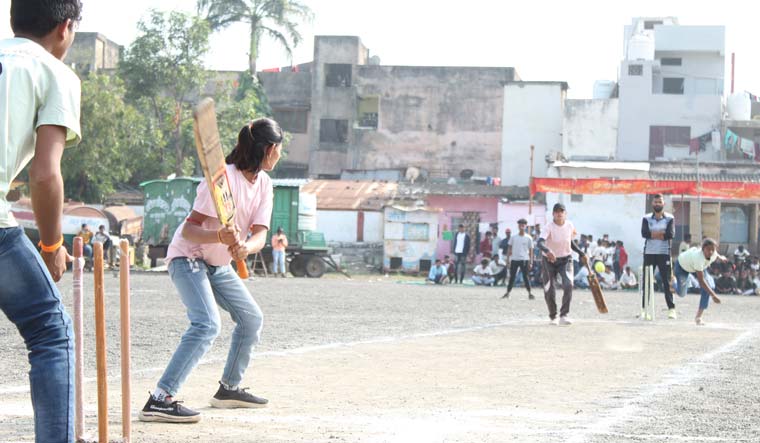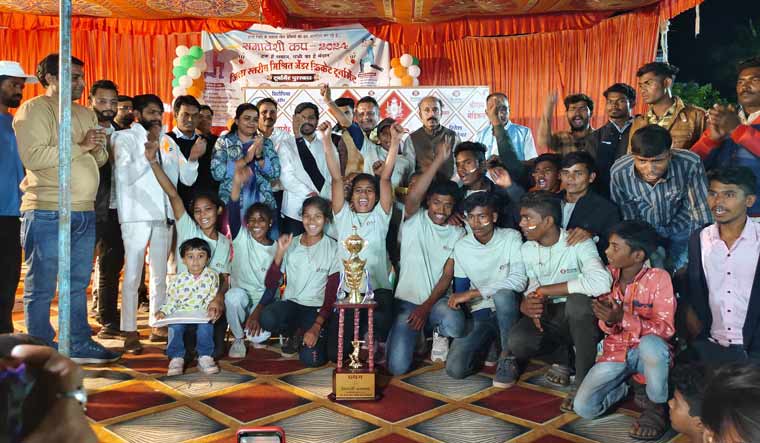When 16-year-old Pinky Navre was asked to speak after receiving the ‘Player of the Series’ trophy, she could just say a few words before she broke down.
“I always wondered when will I be able to make it to the team, when will I finally hit the ground. But, the occasion did come,” the girl said amid tears and loud applause from her teammates, opponents and crowd.
Pinky’s heartfelt words echoed the sentiments of many other young girls gathered at the Nehru Stadium ground of tribal-dominated Harda in Madhya Pradesh, where the cold night of January 14 became witness to a unique sporting tournament that sought to break a major social barrier.
After week-long excitement and competition, the team from Undhaal village won the tournament, defeating the Nimacha team by nine runs in an entertaining final match. The captain of the winning team, 18-year-old Puja Karma, was unwell on the day her team played three matches at quarter, semi and final levels on January 14. At one point she felt like quitting due to her health. “But my father (Jagdish Karma) told me I have to finish what I have started.” So Puja not only stood solid as a captain to steer her team with well-judged decisions, but also took a scintillating catch at boundary line in the final match to contribute significantly to the win.
Puja has not had it easy to get to the level of becoming the winning captain. “I had to drop out of school after class 9 as my school was far from our village. But when the volunteers of Synergy Sansthan came to the village with the idea of involving girls in cricket three years ago, I managed to convince my parents to let me join. With my experience of participating in previous women’s cricket tournaments by the organization, I decided to get a team together this team and though it took a lot of convincing of families of the girls, we did it,” she says.
“I should mention that the girls from our team managed to lead us to wins by themselves the quarter-finals, semifinals and the final. The chance of the male members never came,” Puja adds with a chuckle.
The finals of the district-level ‘Samaveshi (Inclusivity) Cup 2024’ – a first of its kind mixed gender cricket tournament in the country – had just been played at the Nehru Stadium and all participants were resplendent in the glow of having become part of a powerful social message.

The sporting event, organised by NGO Synergy Sansthan, was unique in the sense that each of the participating teams had both female and male players in tone with the motto of ‘Haq hai Samaan; Sabhi ka hai maidaan’ (right is equal; the ground belongs to all).
The cricket competition saw 728 girls and boys from 60 villages in Harda split into 56 teams. The eight-overs-a-side league matches were played at tehsil levels on January 6 and 7, before the first-round quarter-finals were played on January 13. After second-level quarter-finals and semi-finals, the summit clash happened on January 14.
Each team had seven female and four male players. It was made mandatory that the captain and vice-captain of every team should be female players. The batting and bowling were both opened by girls and even one of the umpires in each match was a woman. While women aged between 14 to 26 years participated, only boys below 19 years of age were permitted.
More than providing a chance to showcase their sporting talent, the cricket tournament served to provide the girls and young women from the tribal-dominated villages of Harda to lay a claim on crucial social space.
Synergy Sansthan has been organizing women’s cricket tournaments in the district for the past four years in a bid to develop leadership qualities among girls and imbibe the value of gender parity in society.
Through the tournament, a lot of young girls got the opportunity to hone their cricketing ability, break the gender barriers and encourage other girls in their neighbourhood to follow suit.
“The tournament is more about the right of equality than about winning or losing. All the players lived the concept of equality on the ground. It was basically an attempt to give equal opportunity to the girls,” Vimal Jat, chief executive officer of Synergy Sansthan told The Week.
He said that the socio-cultural ideas about girls participating in sports are still quite restrictive and the tournament has made a big stride in changing this mindset.
Jat added that when the idea of girls' cricket was floated for the first time in the district, a lot of reluctance and opposition arose in the villages, but the young people with the support of Synergy volunteers managed to break down the rigidity. "We have managed the scenario to the point that the mixed-gender tournament could be successfully conducted," he said.
To encourage the players further, the winning team was given a trophy and a Rs 21,000 cash award. The runners-up got a cash prize of Rs 10,000. The teams that finished third and fourth got Rs 5000 each. Every other team that participated were handed Rs 500 cash and a cricket kit.
Crowds turn up in numbers
Despite the foggy and cold weather, the matches drew sizable crowds. The cricketing fields saw high enthusiasm, cheers and placards with gender parity slogans like ‘Jo tez gend ki daud hai; woh gender ka ek mod hai’ (the run of fast bowler is just another turn for issue of gender), ‘Hamare khel ki ek nai pehchan hai; gender samantaa hi uska samman hai’ (this is a new identity of our sports, gender equality is same as respect for gender), ‘cricket khelenge saath; jaanenge gender ki baat’ (will play cricket together and understand the issue of gender).
“I would watch my elder brother and his friends play cricket near our home and so developed an interest in the sport. The ‘bhaiyas’ (elder brothers) supported and encouraged me to practice and I always wanted to play at a big level. Synergy Sansthan’s initiative provided me and my sister (Priyanka) and a long-awaited chance to play at the district level and I am really happy and proud to have performed so well in my first big tournament,” Player of the Series Pinky, a student of class 11 and resident of village Chhidgaon, told The Week.
Pinky scored 189 runs and took four wickets in the tournament and though her team representing Nimacha village (including players from Chhidgaon) lost the final, she is happy to have made a big mark in the crucial initiative.
She is the youngest daughter of a family that sustains itself on manual labour by her parents Sunita and Kodar Navre and Pinky’s elder brother Vikas. Yet, the family is willing to support the sporting interests of their daughters while braving the social norms that frown upon girls playing sports like cricket.
“I have confidence in my daughters and want them to stand on their own feet. They play and they study well too. So I am sure they will do something good with their life and not struggle like us. Opinion of others does not matter, we will support our daughters for their best future,” Sunita said.
Rampal Dhurve, a resident of Kadya village, who attended the league matches regularly, found the initiative unique and praiseworthy. “This is the first time that such matches where girls and boys are playing together has been organised in our region. It is very interesting to watch them play with such competitiveness and enjoyment. I wish the young people best for their future,” he said.
Deepak Rathore, 18 of Team Chirakhan, who got the best fielder award, said that it was a very interesting and learning experience to play in the same team as girls. “It was clear that girls and boys are equal in every aspect, at least on the field of cricket. We played under a female captain and most of the team members were girls, but that wasn’t any problem for us. Rather, in most cases girls outshined boys,” Deepak says.
The chief guest at the award ceremony, BJP Harda district president Rajesh Verma was all praise for the initiative. “This Samavesh Cup cricket tournament that has been organised with the basic concept of gender justice is indeed an appreciable effort. Such events play a very important role in ensuring equality at all levels in the society, especially at a time when the entire world is discussing gender justice,” he said.
Not been an easy journey
However, on the ground, it was not at all easy for the participating girls and women. The families of the selected players won’t allow the girls to go out for practice citing one reason or other.
Puja said that the team members, especially herself and another experienced player Shivani had to tolerate a lot of jeering and ridicule from the villagers when they practiced.
“Are you out to win the World Cup? They would ask us. And see, we did really win the cup,” the teenager says with a lot of pride.
Puja’s pride is reflective of the newfound confidence of the Harda girls who have scripted a new gender success story.



